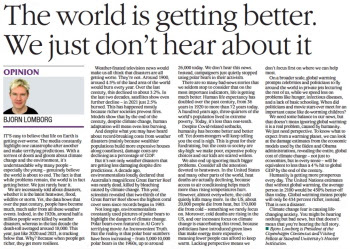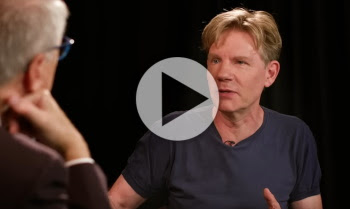Bjorn Lomborg
Let’s focus on the smartest strategies to help the world

|
|
|
|
|
|
|
|
|
|
|
|
|
|
|
|
Bjorn Lomborg
Net zero’s cost-benefit ratio is crazy high

From the Fraser Institute
The best academic estimates show that over the century, policies to achieve net zero would cost every person on Earth the equivalent of more than CAD $4,000 every year. Of course, most people in poor countries cannot afford anywhere near this. If the cost falls solely on the rich world, the price-tag adds up to almost $30,000 (CAD) per person, per year, over the century.
Canada has made a legal commitment to achieve “net zero” carbon emissions by 2050. Back in 2015, then-Prime Minister Trudeau promised that climate action will “create jobs and economic growth” and the federal government insists it will create a “strong economy.” The truth is that the net zero policy generates vast costs and very little benefit—and Canada would be better off changing direction.
Achieving net zero carbon emissions is far more daunting than politicians have ever admitted. Canada is nowhere near on track. Annual Canadian CO₂ emissions have increased 20 per cent since 1990. In the time that Trudeau was prime minister, fossil fuel energy supply actually increased over 11 per cent. Similarly, the share of fossil fuels in Canada’s total energy supply (not just electricity) increased from 75 per cent in 2015 to 77 per cent in 2023.
Over the same period, the switch from coal to gas, and a tiny 0.4 percentage point increase in the energy from solar and wind, has reduced annual CO₂ emissions by less than three per cent. On that trend, getting to zero won’t take 25 years as the Liberal government promised, but more than 160 years. One study shows that the government’s current plan which won’t even reach net-zero will cost Canada a quarter of a million jobs, seven per cent lower GDP and wages on average $8,000 lower.
Globally, achieving net-zero will be even harder. Remember, Canada makes up about 1.5 per cent of global CO₂ emissions, and while Canada is already rich with plenty of energy, the world’s poor want much more energy.
In order to achieve global net-zero by 2050, by 2030 we would already need to achieve the equivalent of removing the combined emissions of China and the United States — every year. This is in the realm of science fiction.
The painful Covid lockdowns of 2020 only reduced global emissions by about six per cent. To achieve net zero, the UN points out that we would need to have doubled those reductions in 2021, tripled them in 2022, quadrupled them in 2023, and so on. This year they would need to be sextupled, and by 2030 increased 11-fold. So far, the world hasn’t even managed to start reducing global carbon emissions, which last year hit a new record.
Data from both the International Energy Agency and the US Energy Information Administration give added cause for skepticism. Both organizations foresee the world getting more energy from renewables: an increase from today’s 16 per cent to between one-quarter to one-third of all primary energy by 2050. But that is far from a transition. On an optimistically linear trend, this means we’re a century or two away from achieving 100 percent renewables.
Politicians like to blithely suggest the shift away from fossil fuels isn’t unprecedented, because in the past we transitioned from wood to coal, from coal to oil, and from oil to gas. The truth is, humanity hasn’t made a real energy transition even once. Coal didn’t replace wood but mostly added to global energy, just like oil and gas have added further additional energy. As in the past, solar and wind are now mostly adding to our global energy output, rather than replacing fossil fuels.
Indeed, it’s worth remembering that even after two centuries, humanity’s transition away from wood is not over. More than two billion mostly poor people still depend on wood for cooking and heating, and it still provides about 5 per cent of global energy.
Like Canada, the world remains fossil fuel-based, as it delivers more than four-fifths of energy. Over the last half century, our dependence has declined only slightly from 87 per cent to 82 per cent, but in absolute terms we have increased our fossil fuel use by more than 150 per cent. On the trajectory since 1971, we will reach zero fossil fuel use some nine centuries from now, and even the fastest period of recent decline from 2014 would see us taking over three centuries.
Global warming will create more problems than benefits, so achieving net-zero would see real benefits. Over the century, the average person would experience benefits worth $700 (CAD) each year.
But net zero policies will be much more expensive. The best academic estimates show that over the century, policies to achieve net zero would cost every person on Earth the equivalent of more than CAD $4,000 every year. Of course, most people in poor countries cannot afford anywhere near this. If the cost falls solely on the rich world, the price-tag adds up to almost $30,000 (CAD) per person, per year, over the century.
Every year over the 21st century, costs would vastly outweigh benefits, and global costs would exceed benefits by over CAD 32 trillion each year.
We would see much higher transport costs, higher electricity costs, higher heating and cooling costs and — as businesses would also have to pay for all this — drastic increases in the price of food and all other necessities. Just one example: net-zero targets would likely increase gas costs some two-to-four times even by 2030, costing consumers up to $US52.6 trillion. All that makes it a policy that just doesn’t make sense—for Canada and for the world.
Bjorn Lomborg
The stupidity of Net Zero | Bjorn Lomborg on how climate alarmism leads to economic crisis

From spiked on YouTube
Note: This interview is focused on Europe and the UK. It very much applies to Canada. The 2025 Federal Election which will see Canadians choose between a more common sense approach, and spending the next 4 years continuing down the path of pursuing “The Stupidity of Net Zero”.
European industry is in freefall, and Net Zero is to blame.
Here, climate economist Bjorn Lomborg – author of Best Things First and False Alarm – explains how panic over climate change is doing far more damage than climate change itself. Swapping cheap and dependable fossil fuels for unreliable and expensive renewables costs our economies trillions, but for little environmental gain, Lomborg says.
Plus, he tackles the myth of the ‘climate apocalypse’ and explains why there are more polar bears than ever.
Support spiked: https://www.spiked-online.com/support/
Sign up to spiked’s newsletters: https://www.spiked-online.com/newslet…
-

 2025 Federal Election2 days ago
2025 Federal Election2 days agoStudy links B.C.’s drug policies to more overdoses, but researchers urge caution
-

 Business2 days ago
Business2 days agoIs Government Inflation Reporting Accurate?
-

 2025 Federal Election2 days ago
2025 Federal Election2 days agoCarney’s Hidden Climate Finance Agenda
-

 2025 Federal Election2 days ago
2025 Federal Election2 days agoWhen it comes to pipelines, Carney’s words flow both ways
-

 2025 Federal Election2 days ago
2025 Federal Election2 days agoPolls say Canadians will give Trump what he wants, a Carney victory.
-

 2025 Federal Election2 days ago
2025 Federal Election2 days agoThe Anhui Convergence: Chinese United Front Network Surfaces in Australian and Canadian Elections
-

 2025 Federal Election21 hours ago
2025 Federal Election21 hours agoPoilievre Campaigning To Build A Canadian Economic Fortress
-

 Automotive21 hours ago
Automotive21 hours agoCanadians’ Interest in Buying an EV Falls for Third Year in a Row















